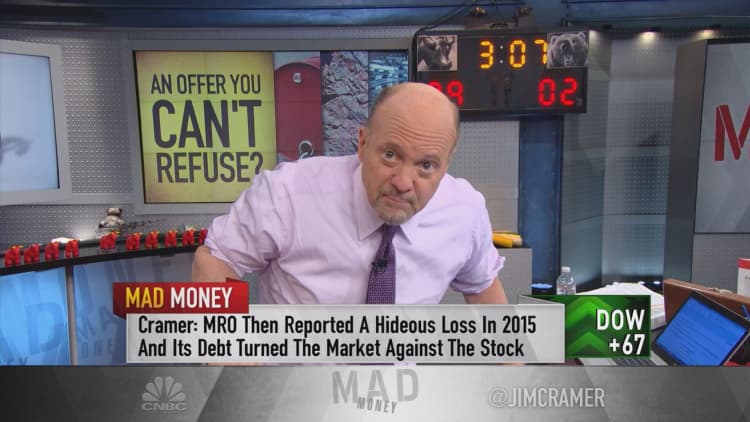
Suddenly, the market has embraced everything it hated just a few weeks ago, especially the speculative stocks of commodity-based companies. Jim Cramer boiled the rally down to the bold moves of commodity players issuing secondary offerings.
The rally began with a tremendous amount of short-sellers covering positions, but Cramer thinks it is the secondary offerings is what saved the day. While the offerings can be dilutive — meaning that when the earnings come back, each share will make less —but Cramer saw an upside, too.
"The beautiful thing here is that the company will live to play again, even in a scenario where oil prices stay lower longer," the "Mad Money" host said.
Just like the banks did massive equity offerings in the bad old days of the Great Recession, they too got saved. This is the same thing.Jim Cramer
For instance, Marathon Oil was once one of the top players in the oil patch. In 2015, it lost a striking $3.26 per share, and investors turned the stock into a pariah over concerns with its debt. Oil roared up to $33 at the end of February, which brought Marathon back to $8.23
But on Feb. 29, 2016, the company announced an equity offering of 135 million shares at a substantial discount to its last sale. The discount was so big that institutions flocked to it, and the company was able to sell an extra 10 million shares. The stock has not looked back since.
"That is phenomenal," Cramer said.
Read more from Mad Money with Jim Cramer
Cramer Remix: What you didn't learn in school
Cramer: Untangling the IRA, 401(k) Roth mystery
Cramer: Young investor? Here's where to start
The power of these deals is that they accomplish two things: they give companies the cash they need to keep drilling and cover expenses, and they give banks breathing room so that they do not have to write down debt.
"The former is why the stocks can pop so much — consider it an instant steroid that makes them better. The latter is why the banks can rally as they have," Cramer said.
With the success of oil companies issuing equity and so many buyers making money from the deals, Cramer suspects it could happen to pretty much any player in the oil patch. He compared the success of these secondary offerings to an IPO.
He could even see a company like Chesapeake, which owes billions in debt, could pull a Marathon and raise money to cover its debt that could come due in the next few years.
These extraordinary moves are not just limited to oil. Cramer has seen big moves happening in other commodities such as iron ore, which rallied 19 percent in one session following the Chinese government's announcement of aggressive goals for growth over the weekend.
"I bet Freeport could easily sell 100 million shares and eliminate any near-term liquidity concerns, which would, again, allow the stock to climb ever higher. The virtuous circle at work," Cramer said.
Cramer does have concerns with the recent run in commodities, though. It is based on commodity prices rising, and he does not think that is going to happen.
However, considering the way these companies have managed to stay afloat with the secondaries, it could mean that the worst is over for commodity stocks that have moved above the $2 to $3 range.
"Just like the banks did massive equity offerings in the bad old days of the Great Recession, they, too, got saved. This is the same thing," Cramer said.
And while the commodity rally won't last forever, the secondary offerings do give a bullish edge to the once beaten-down sector.
Questions for Cramer?
Call Cramer: 1-800-743-CNBC
Want to take a deep dive into Cramer's world? Hit him up!
Mad Money Twitter - Jim Cramer Twitter - Facebook - Instagram - Vine
Questions, comments, suggestions for the "Mad Money" website? madcap@cnbc.com



